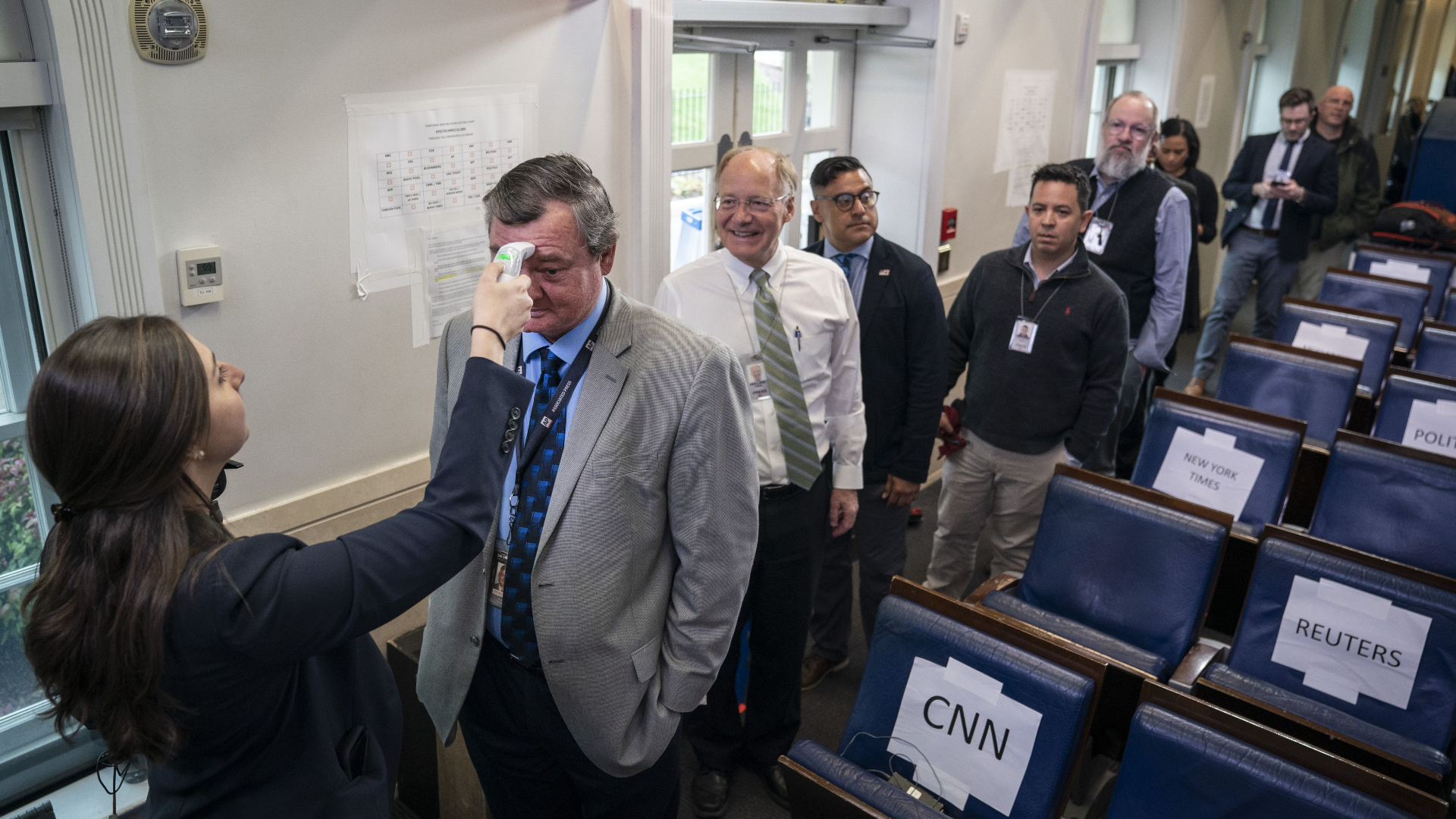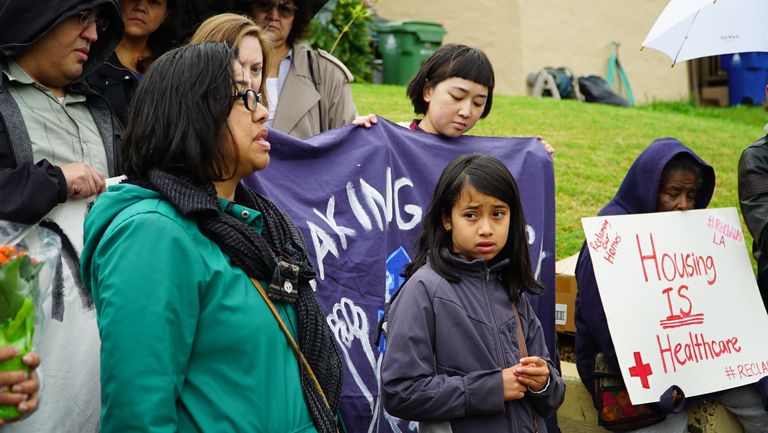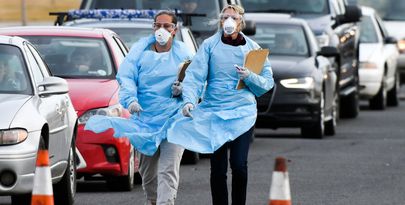COVID-19 Exposes the Dangers of Gender Inequality
Time's Up CEO Tina Tchen argues that stronger paid leave policies could have prepared the U.S. to better respond the coronavirus outbreak.

Women now represent a majority of the U.S. workforce —but in addition to their paid employment, they still take on the majority of unpaid household labor and care work. From breadwinner to bread maker, client care to child care, women spend 102 more hours a year than men on unpaid chores and family care. This deeply-ingrained gender imbalance is known as the “second shift.”
Now, as COVID-19 forces schools to close, businesses to shutter, and hospitals to ration care, many women have to do even more with even less, creating a veritable “third shift” that endangers everyone’s health and well-being. It doesn’t have to be this way. Congress can step up and pass legislation that immediately—and permanently—provides all working people with paid sick days and paid family leave to care for sick loved ones.
Right now, the United States is one of only two OECD countries in the world that does not guarantee workers paid leave for personal illness, leaving some 32 million U.S. workers without access to a single paid sick day. While 11 states, including the District of Columbia and 22 other jurisdictions, have passed paid sick leave laws, this is far from adequate. Everyone, at all times, but especially in the midst of this unprecedented public health crisis, needs paid sick days, no matter where they live or the size of their employer.
The inadequacy of U.S. policies to protect workers leaves all of us at greater risk.
The lack of paid sick days in the United States hurts all working families. The impact, however, is felt most acutely by women, particularly those in low-wage jobs and women of color. More than half of Latinas and one-third of Black women do not have the option to take paid time off when they are sick and seven out of 10 workers in low-paid jobs do not have paid sick days.
And that leaves all of us at greater risk. Studies show that if a worker lacks sick leave, they are 1.5 times more likely to go to work when they feel sick. Sick workers who show up at their jobs—at childcare centers, nursing homes, or offices—threaten not only their own road to recovery, but also the health of those around them. Unfortunately, the workers who most often interact with the public, like nurses, housekeepers, social workers, and caregivers, are the least likely to be able to heed the CDC’s advice to stay home if they are sick. Coupled with school closures and an increasingly strained health care system, these systemic racial and gender inequities that are dangerous in the best of times become potentially deadly in the face of a global pandemic, COVID-19.
Women are also usually responsible for the care of sick loved ones. According to a recent study on unpaid caregiving, 60 percent of unpaid caregivers are women, meaning many women are responsible for taking care of sick relatives, aging parents, and children, all while working low-wage jobs to make ends meet. For women of color, the burden is even greater, with Black family caregivers spending an average of 28.5 more hours per month caregiving than white family caregivers. Lack of paid leave means many women might have to leave vulnerable loved ones at home alone, or lose income to stay home and care for them.

No one should fall into financial ruin or experience hardship in the workplace simply because they need to take time off from work to care for a new child, tend to an ill family member, recover from an injury, or help stop the spread of the coronavirus. Congress has taken an important step forward by crafting emergency paid sick days legislation, but this legislation falls far short of what is needed to flatten the curve and ensure all workers can take time off to protect their own health and the health of those around them.
Stay In The Know
Get exclusive access to fashion and beauty trends, hot-off-the-press celebrity news, and more.
The emergency aid package, called the Families First Coronavirus Response Act, which President Trump signed on March 18, establishes federal emergency paid-leave benefits, but only for some. It mandates that private employers with fewer than 500 employees provide two weeks of paid sick leave if employees can't work due to quarantine, COVID-19 symptoms, or if they have to care for a child or family member impacted by COVID-19. Small businesses of less than 50 employees may be exempt, so about 12 million workers may not qualify. An additional 6.5 million people who work for companies of over 500 people who in 2019 did not have paid sick days are also at risk.
We need paid sick leave for all workers permanently, including after this crisis passes, because no one should have to choose between their job and their health or the health of their family at any time. We don’t have a moment to lose. Too many lives are at risk.
Employers don’t have to wait for public policymakers to act, they can extend paid leave on their own. By investing in their workforce, employers can retain their trained and committed workers and emerge stronger and ready to move forward as our economy comes back.
That’s why we all have a responsibility to do our part to protect our communities, whether you are a business leader who can provide paid sick days to your workers or an individual who can use your voice to help make paid leave a reality for all workers, without exceptions.
The need for paid sick leave isn’t new, but it’s more urgent than ever.
Tina Tchen is the president and CEO of TIME’S UP Now, which works to create safe, fair, and dignified work for all by changing culture, companies, and laws. Text NOW to 306-44 to join the fight.
For more stories like this, including celebrity news, beauty and fashion advice, savvy political commentary, and fascinating features, sign up for the Marie Claire newsletter.
Related Stories


-
 Hailey Bieber Combines Vintage Mugler With 2025's Sneaker Trend
Hailey Bieber Combines Vintage Mugler With 2025's Sneaker TrendThe model wore the perfect high-low combination for a night at the festival.
By Amy Mackelden Published
-
 Tyla's Coachella Outfit Pairs Dolce & Gabbana With Pandora
Tyla's Coachella Outfit Pairs Dolce & Gabbana With PandoraThe singer wore a gold version of the crystal bra made famous by Aaliyah.
By Amy Mackelden Published
-
 How Kate Middleton Is Influencing George's Fashion Choices
How Kate Middleton Is Influencing George's Fashion ChoicesThe future king's smart blazer is straight out of Princess Kate's style playbook.
By Amy Mackelden Published
-
 36 Ways Women Still Aren't Equal to Men
36 Ways Women Still Aren't Equal to MenFeatures It's just one of the many ways women still aren't equal to men.
By Brooke Knappenberger Last updated
-
 How New York's First Female Governor Plans to Fight for Women If Reelected
How New York's First Female Governor Plans to Fight for Women If ReelectedKathy Hochul twice came to power because men resigned amid sexual harassment scandals. Here, how she's leading differently.
By Emily Tisch Sussman Last updated
-
 Why the 2022 Midterm Elections Are So Critical
Why the 2022 Midterm Elections Are So CriticalAs we blaze through a highly charged midterm election season, Swing Left Executive Director Yasmin Radjy highlights rising stars who are fighting for women’s rights.
By Tanya Benedicto Klich Published
-
 Tammy Duckworth: 'I’m Mad as Hell' About the Lack of Federal Action on Gun Safety
Tammy Duckworth: 'I’m Mad as Hell' About the Lack of Federal Action on Gun SafetyThe Illinois Senator won't let the memory of the Highland Park shooting just fade away.
By Sen. Tammy Duckworth Published
-
 Roe Is Gone. We Have to Keep Fighting.
Roe Is Gone. We Have to Keep Fighting.How To Democracy always offers a path forward even when we feel thrust into the past.
By Beth Silvers and Sarah Stewart Holland, hosts of Pantsuit Politics Podcast Published
-
 The Supreme Court's Mississippi Abortion Rights Case: What to Know
The Supreme Court's Mississippi Abortion Rights Case: What to KnowThe case could threaten Roe v. Wade.
By Megan DiTrolio Published
-
 Sex Trafficking Victims Are Being Punished. A New Law Could Change That.
Sex Trafficking Victims Are Being Punished. A New Law Could Change That.Victims of sexual abuse are quietly criminalized. Sara's Law protects kids that fight back.
By Dr. Devin J. Buckley and Erin Regan Published
-
 My Family and I Live in Navajo Nation. We Don't Have Access to Clean Running Water
My Family and I Live in Navajo Nation. We Don't Have Access to Clean Running Water"They say that the United States is one of the wealthiest countries in the world. Why are citizens still living with no access to clean water?"
By Amanda L. As Told To Rachel Epstein Published